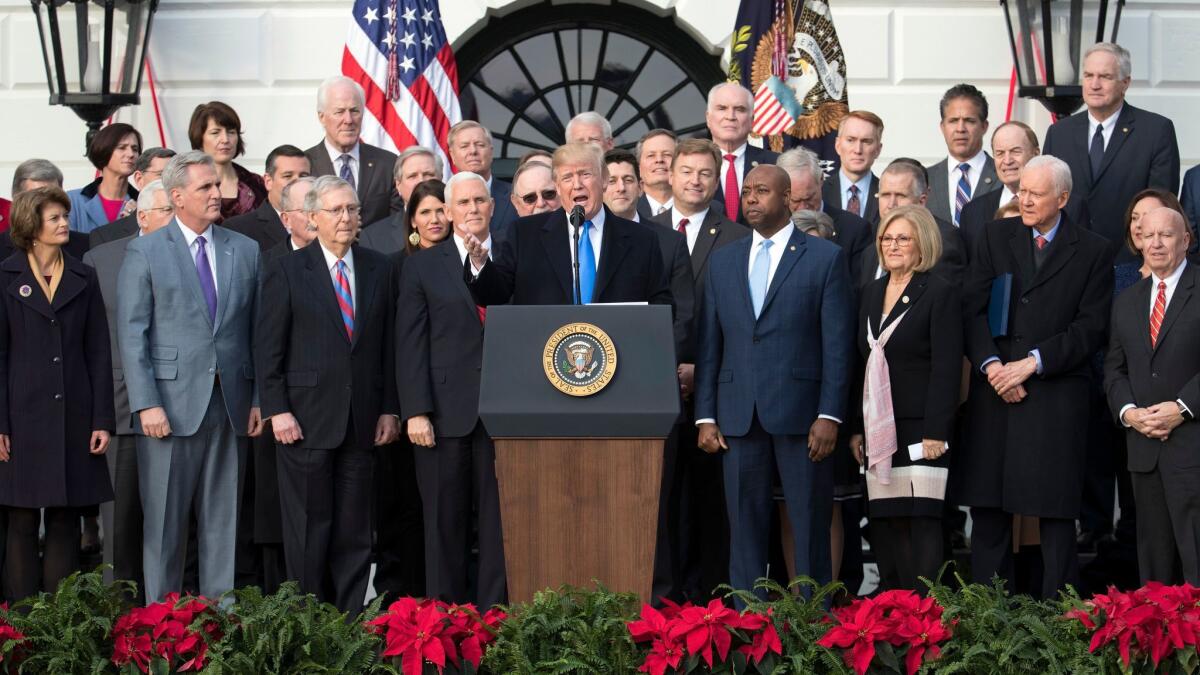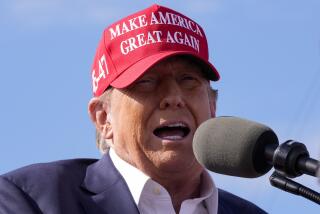Trump notches first big legislative win with tax-cut bill — but it’s far from his populist promises

After 11 months in office, President Trump on Wednesday got to celebrate one of the things he’s coveted most — a major legislative achievement — and on his party’s signature issue, tax cuts.
For a president who loves to tally wins and loathes losses, Congress’ final approval of the tax bill hours earlier was an essential capstone to a year in which Trump rolled back scores of regulations, sharply limited a refugee program, seated a conservative Supreme Court justice and opened vast new areas for oil exploration.
Despite a Congress controlled by Republicans, however, Trump had signed none of his major legislative promises into law this year and suffered one spectacular failure, on repealing President Obama’s health insurance law. Now he ends the year on a high note, though one that comes with a big caveat.
“We’re bringing the entrepreneur back into this country,” Trump declared at a triumphant White House gathering with Republican lawmakers, several of whom praised him effusively. “Ultimately what does it mean? It means jobs — jobs, jobs, jobs.”
The tax bill, which Trump will sign in coming days, comes with potential political costs. The legislation overwhelmingly benefits corporations and wealthy Americans like himself, undermining his promises to govern as a populist, and all but rules out his pledge to wipe out the national debt, adding at least $1 trillion in debt in its first 10 years.
A separate provision repeals a core part of Obamacare, eliminating the requirement that individuals buy insurance or pay a tax penalty, but the bill offers no plan to fulfill Trump’s promise to see that all Americans have health coverage. Instead, nonpartisan analyses say millions will lose or give up insurance as a consequence of ending the individual mandate.
Trump ceded drafting of many of the details to congressional Republicans, and the result was a plan that largely hews to GOP tax-cutting orthodoxy: It mostly benefits corporations and high-income individuals, on the bet that economic growth will mean more jobs and higher wages for lower-income Americans.
When Trump did weigh in, it was often with advice on the kind of branding for which he’s well known. He told staff and GOP lawmakers to use phrases like “tax cuts for Christmas,” “middle-class miracle,” and “rocket fuel for economy.”
Trump is banking on his salesmanship to overcome the bill’s dismal poll numbers. In an NBC-Wall Street Journal survey, 63% of respondents said they believed the plan was designed primarily to help corporations and the wealthy. Just 7% agreed it was intended “mostly to help middle-class Americans” — as Trump and congressional Republicans contend.
The president opened the White House celebration by promoting an announcement Wednesday by AT&T — which needs administration support for its merger with Time-Warner — that it would offer $1,000 bonuses to 200,000 employees and invest $1 billion in the U.S. after the bill becomes law.
Several other corporations, including Boeing, Fifth Third Bank and Wells Fargo, announced similar actions. Democrats countered with a list of 32 corporations — among them Home Depot, Pfizer, T-Mobile and Mastercard — that have announced billions in stock buybacks, which, along with higher dividends and executive bonuses, are more common responses than wage increases from companies with new cash.
The current perception that the bill is a gift to elites drives directly against Trump’s core message that he is a different kind of Republican who champions “the forgotten man and the forgotten woman.”
“I don’t mind paying a little more in taxes,” Trump told Bloomberg in August 2015, just after entering the presidential race. “The middle class is getting clobbered in this country.”
“The hedge fund people make a lot of money and they pay very little tax,” he added. “I want to lower taxes for the middle class.”
Back then Trump proposed ending a tax break that benefits hedge fund managers and private equity investors — the so-called carried-interest loophole that allows them to pay taxes on much of their income at a lower capital gains rate, rather than at the higher rate for ordinary income. Yet that tax break survived.
Ann Coulter, a conservative commentator and sometime Trump ally, has led the backlash. “Despite @realDonaldTrump’s repeated promise to eliminate hedge fund managers’ totally unfair tax loophole, GOP tax bill preserves it,” she tweeted.
While eliminating the tax break would not raise a large amount of revenue in the context of the multitrillion-dollar tax system — about $14 billion over 10 years — it has enormous symbolic value because its beneficiaries are the very Wall Street types that candidate Trump attacked.
Gary Cohn, director of Trump’s National Economic Council and a former Goldman Sachs executive, said Wednesday that the administration team “tried 25 times” to get rid of the carried-interest loophole. He blamed the Republican-controlled Congress: “We hit opposition in that big white building with the dome at the other end of Pennsylvania Avenue every time we tried.”
But there is no evidence Trump himself insisted on the change.
The tax bill also would greatly reduce the already small number of wealthy estates subject to estate taxes, lower the top income tax rate for the highest earners, give large tax cuts to corporations and create new tax breaks for big real estate investors and landlords like Trump.
The alternative minimum tax, designed to make sure the wealthiest Americans don’t avoid paying taxes through deductions and other tax breaks, will affect far fewer people.
Trump continues to say that he’ll take a personal hit. Independent analysts say he stands to benefit significantly. The truth won’t be known, however, because the president — who ignored a reporter’s shouted question about his potential gains during a Cabinet meeting Wednesday — refuses to release his tax returns as predecessors for four decades have done.
“There are elements of the bill that are clearly targeted to the rich and that’s made it very hard to sell the idea that the rest of it even exists,” said Joseph Thorndike, director of the Tax History Project at Tax Analysts, a nonpartisan research forum.
Thorndike noted that the bill does include cuts for most middle-income and working-class taxpayers, including an expanded standard deduction and a doubled child tax credit, and reduces some deductions for the affluent, including for interest on their mortgage loans and for local and state taxes. Still, he said, the package “leans toward the plutocratic.”
Thorndike predicted few lower- and middle-income taxpayers will notice the difference in their paychecks, making it harder to reverse the plan’s unpopularity.
An analysis by the Tax Policy Center found the most benefit would go to the super-rich, with the disparity in benefits growing wider a decade from now. That’s because the individual income tax cuts expire, while most corporate tax reductions are permanent. Next year, 5% of taxpayers would pay higher taxes; 9% would pay more in 2025; and a full 53% would pay more in 2027.
Nearly 83% of the tax cuts’ value would go to the wealthiest 1% of Americans by 2027, the center found.
Republicans argue that political pressure will force a future Congress to extend the individual tax cuts — but that would add trillions more to the debt.
Joseph Rosenberg, a senior research associate who worked on the analysis, said earlier versions of the bill favored the wealthy even more. As for benefits trickling down, he and other economists say wages are unlikely to increase as the White House is promising.
“Whatever gains there are are likely to be way smaller than the White House has promised and evolve much slower than what they’ve implied,” he said.
Mainstream Republicans, once wary of Trump’s populist rhetoric on taxes, put aside their public concerns over deficits to rally around their higher priority, tax cuts.
According to Douglas Holtz-Eakin, a former economic advisor to President George W. Bush and director of the Congressional Budget Office, the corporate cuts were a “longstanding objective of Republicans that got married to Trump’s campaign pledge for middle-class tax cuts.”
Twitter: @noahbierman
Twitter: @ByBrianBennett
More to Read
Get the L.A. Times Politics newsletter
Deeply reported insights into legislation, politics and policy from Sacramento, Washington and beyond. In your inbox three times per week.
You may occasionally receive promotional content from the Los Angeles Times.








